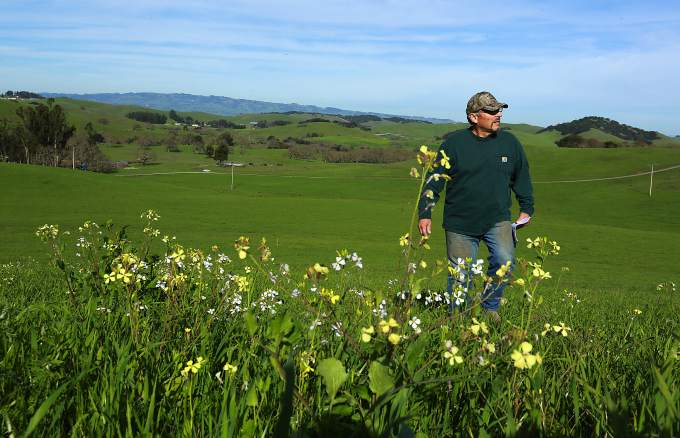
Cleaning up and Sequestering Carbon with Compost
The rolling green pastures west of Petaluma where Hank Corda stood last week in blue jeans and a camouflage ball cap are not an obvious location to mount a worldwide offensive against climate change.
No factories billow smoke on the 850-acre ranch that’s been in Corda’s family for a century, nor do many vehicles traverse the narrow road. One might surmise the only gross polluters here are the black-and-white dairy cows that graze the property.
In fact, rangelands are a major source of carbon loss through the farming techniques used for harvesting and soil management. A major key to solving the problem, researchers contend, is in the soil on a hillside below Corda’s ranch home.
March 1, 2015 | Source: Press Democrat | by Derek Moore
The rolling green pastures west of Petaluma where Hank Corda stood last week in blue jeans and a camouflage ball cap are not an obvious location to mount a worldwide offensive against climate change.
No factories billow smoke on the 850-acre ranch that’s been in Corda’s family for a century, nor do many vehicles traverse the narrow road. One might surmise the only gross polluters here are the black-and-white dairy cows that graze the property.
In fact, rangelands are a major source of carbon loss through the farming techniques used for harvesting and soil management. A major key to solving the problem, researchers contend, is in the soil on a hillside below Corda’s ranch home.
There, workers dumped compost made of manure and green landscape waste to trap carbon dioxide in the ground and also absorb it from the air. The ranch, which is at the head of San Antonio Creek, is one of three test sites for a novel “carbon-farming” program that researchers say could dramatically lower greenhouse-gas emissions and blunt the effects of climate change, but only if it can be replicated on a mass scale.
The Marin Carbon Project has drawn attention from scientists around the world and, closer to home, from agricultural producers in neighboring counties. It has also caught the attention of Sacramento lawmakers, including Assemblyman Marc Levine, D-San Rafael, who was expected to introduce legislation Monday to expand the program in California.
Advocates say if compost was applied to just 5 percent of California’s grazing lands, the soil could capture a year’s worth of greenhouse gas emissions from the state’s farm and forestry industries.
Corda, a self-described libertarian, is not normally one to buy into big, government-funded ideas. But he agreed to let project managers dust about 20 acres of his ranch with compost and to monitor the progress because he supports helping the environment and boosting his bottom line.
If nothing else, the compost should promote lovely growth in the silage crops that were planted on the spot. Corda’s also hoping he’ll be rewarded with carbon offset credits.
He predicted that some of his ranching neighbors, who have questioned his involvement in the program, will one day regret that stance.
“Old habits die hard,” he said.
